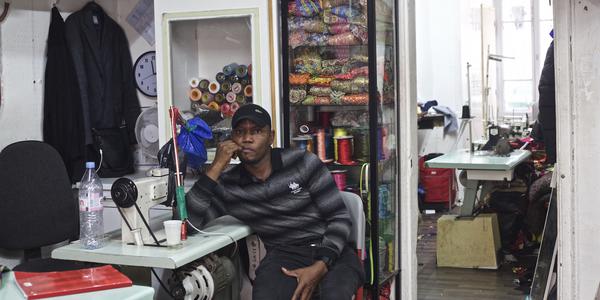The street of traditional African tailors in La Chapelle<
Rue Jean Robert, Paris 18th – This Saturday, all the work tables in Boubacar's workshop are occupied. Below the shelves that are crumbling under mountains of wax fabrics, five designers are busy , retouching here and there a boubou or embroidering patterns on the collar of a suit. The twenty square meters of the workshop are transformed, over the afternoon, into a true self-service sewing area. Each customer has the possibility to choose his tailor, his cut, as well as the fabric in order to create his own garment.
A woman just puts on a bazin boubou set with pearls in the improvised fitting room at the back of the shop. Between two visits, the tailors cheat time by listening to the football match between Bordeaux and Monaco. The discussion turns to PSG who beat Nice 3-0 the day before. A tailor, who obviously seems to want to do battle, launches:
A cigarette break before getting back to work / Credits: Lea Esmery
Tailor's Street
Outside, a dozen people are waiting in front of the window. Malians, Ivorians, Guineans… In rue Jean Robert, a small alley wedged between the rails and the Montmartre hill, a dozen African tailors have opened up shop over the past five years. The address has since attracted its fair share of regulars and curious visitors. “Here, the designers have learned the trade in the country. They mainly make traditional clothes,” explains local regular Alpha Diallo:
However, the tailors are not limited to the corpus they have been taught. In Boubacar and Beye's workshop, traditional tailors and artisans more inspired by European fashion rub shoulders. Alpha Amadou Bah, on the other hand, specializes in the design of European models. “But my clientele is more looking for traditional clothes. I'm not complaining, I have enough to eat,” he says, cutting a strip of colorful fabric. As for Boubacar, a 42-year-old Senegalese, he aims to mix African influence and European cup.
Boubacar hesitates between 2 fabrics/Credits: Lea Esmery

Passionate and needy
While he was doing his hand in interim on haute couture collections, Boubacar decided to start his business to create his own models in his free time . It was in 2012 that he opened his studio at 12 rue Jean Robert. This is also the case for Beye, one of the pioneers of the street of tailors. In the half-light of the Le Renommé bar, a troquet placed a stone's throw from his shop, the man takes it into his head to show us the specificities and currents of African fashion. "Sewing is widespread all over Africa but there is a difference between Mali, Senegal and Guinea where tailors make rather traditional clothes, especially boubous", explains the man while sipping a mint tea :
His eyes shine when he thinks of Abidjan, the Mecca of African haute couture and its great couturiers like Pathé'O or Alphadi. If for some sewing is a passion, for others it is a necessity . This is the case of Alpha Amadou Bah. “Me, what I wanted to do was the army and then studies,” he confides, casting a sullen glance at his work:
Originally from Guinea, this forties was placed at the age of 13 in a workshop where he learned to sew. Since then, he has never let go of his machine.
At work/Credits: Lea Esmery
The tailors' galley
But behind this apparent affluence hides a completely different reality. Galley of money, lack of customers, homesickness… Life is far from simple for the tailors of rue Jean Robert. “Hi my brother, how are you? “says Boubacar to a Taxi G7 driver who stopped in front of his workshop. "He too is a designer, but he had to take a second job because it doesn't bring in enough," he explains once the car has left. paradise,” continues Boubacar once he is seated in his place:
"I got used to the hassle", loose the man, philosopher. "In summer it works well, but in winter it's the off season so if you don't work on the side, you can stay on your machine all day with your arms folded," says Beye, who runs sewing workshops for women. in reintegration to earn a living. Surface technician during the week at Monoprix, Samassa, only comes to the workshop on weekends:
A kebab and then leaves
The small room ends up filling up all the same. Space is becoming increasingly scarce. We are shown the exit. A few meters further on, one of the tailors from the workshop turns up, a kebab in his hand. He hasn't had time to eat all day yet.
A look towards the shop and the concern is painted on his face. The seats in front of his work table are once again occupied . At the African tailors of rue Robert, the customer is king.


 Tags:
Tags: Prev
Prev







